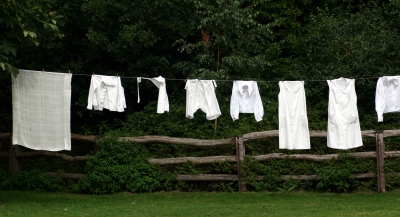-
History of:
- Resources about:
- More:
- Baby walkers
- Bakehouses
- Bed warmers
- Beer, ale mullers
- Besoms, broom-making
- Box, cabinet, and press beds
- Butter crocks, coolers
- Candle snuffers, tallow
- Clothes horses, airers
- Cooking on a peat fire
- Drying grounds
- Enamel cookware
- Fireplaces
- Irons for frills & ruffles
- Knitting sheaths, belts
- Laundry starch
- Log cabin beds
- Lye and chamber-lye
- Mangles
- Marseilles quilts
- Medieval beds
- Rag rugs
- Rushlights, dips & nips
- Straw mattresses
- Sugar cutters - nips & tongs
- Tablecloths
- Tinderboxes
- Washing bats and beetles
- Washing dollies
- List of all articles
Subscribe to RSS feed or get email updates.
They that wash on Monday
Have all the week to dry;
They that wash on Tuesday
Are not so much awry;
They that wash on Wednesday
Are not so much to blame;
They that wash on Thursday,
Wash for shame;
They that wash on Friday,
Wash in need;
And they that wash on Saturday,
Oh ! they're sluts indeed.
"Standard" version
Halliwell, Nursery Rhymes of England, 1842
They that wash on Monday
Have a whole week to dry;
They that wash on Tuesday
Are not so much agye;
They that wash on Wednesday
May get their clothes clean;
They that wash on Thursday
Are not so much to mean;
They that wash on Friday
Wash for their need;
But they that wash on Saturday
Are clarty-paps indeed!
Northern English version
Halliwell, Popular Rhymes, 1849
They that wash on Monday
Have all the week to dry;
They that wash on Tuesday
They have pretty nigh;
They that wash on Wednesday
Have half the week past;
They that wash on Thursday
Are very near the last;
They that wash on Friday
Wash for need;
They that wash on Saturday
Are sluts indeed.
Northamptonshire version
Baker, Glossary of Northamptonshire Words and Phrases, 1854
They that wash on Monday
Get all the week to dry;
They that wash on Tuesday
Are pretty near by;
They that wash on Wednesday
Make a good housewife;
They that wash on Thursday
Must wash for their life;
They that wash on Friday
Must wash in need;
They that wash on Saturday
Are sluts indeed.
West of England version
Northall, English Folk Rhymes, 1892
Mrs. Bute, who knew how many days the sirloin of beef lasted at the Hall; how much linen was got ready at the great wash; how many peaches were on the south wall; how many doses her ladyship took when she was ill — for such points are matters of intense interest to certain persons in the country — ...
Thackeray, Vanity Fair, 1847
Wash on Monday?
Great wash, grand wash, wash-days months apart
 "They that wash on Monday have all the week
to dry..."
"They that wash on Monday have all the week
to dry..."
Victorian advice on housekeeping routines set in stone the idea that Monday should be wash-day, so that everything could be dried, pressed, aired and folded well before Sunday, the day of rest and clean clothes. The rhymes in the left-hand column show there's a long tradition of a "virtuous" weekly laundry cycle starting on Mondays.
But that's not the whole story. We may wrinkle our noses at the thought of washing done every few months, as it was in Elizabethan England, but in some well-to-do households this pattern of laundering continued for centuries.
It wasn't a simple question of hygiene, or lack of it. People took pride in having enough linen to manage without washing frequently. And the process was such a huge disruption to other domestic routines, taking up to four days even in good drying weather, that there were advantages in spacing it further apart. A visiting washerwoman might come for a couple of days every few weeks to undertake some or all of the work.
In 1760 Hannah Glasse discussed methods for a successful "great wash". It sounds as if she expected this to happen every few weeks, though she realised that "Different Countries and different Places have all a different Manner or Way of preparing for the great Wash" - as opposed to little interim "slop-washes" of things that had to be laundered in between times. (See Glasse's The Servant’s Directory, or House-keeper’s Companion.)
The custom of a great or grand wash lasted longer outside big cities. It was still favoured by some English people right up to the late 19th century. Flora Thompson described a village postmistress she knew around 1890:
Miss Lane still kept to the old middle-class country custom of one huge washing of linen every six weeks. In her girlhood it would have been thought poor looking to have had a weekly or fortnightly washday. The better off a family was, the more changes of linen its members were supposed to possess, and the less frequent the washday...
For the big wash at Miss Lane's, a professional washerwoman came for two days [...] steam and the smell of soapsuds came in great puffs from the window and door of the small, detached building known as the 'washhouse' [...] sheets and pillow-cases and towels were billowing in the wind on a line...
On the evening of the second washday, the washerwoman departed with three shillings [...] The rest of the week was spent by the family in sprinkling, mangling, ironing and airing the clothes.
Flora Thompson, Candleford Green, 1945
A well-stocked linen cupboard, avoiding weekly wash-days, was admired in Germany too.
After the vintage and the harvest are finished, commences the house-cleaning and the preparations for the grand wash, and during October, one may see everywhere the lawns and the grass-plots covered with the snowy linen. The washerwomen go from family to family during all the autumn, and in every one they commence their operation, at exactly twelve o'clock at night. From the great chests in the garret, where it has been collecting for half a year, the family bring the linen and deposit it in the washroom, provide the soap and lye, get the tubs and kettles in readiness and retire.
The stacks of linen are the boast of Germans and the wonder of Americans, but they are beginning to confess that this is quite unnecessary, and has been kept up by a very ridiculous pride. It is becoming the fashion to wash at least once a month, but more especially at the north, and some families have the washing done in the house every two weeks, exactly like English and Americans.
Anna Cummings Johnson, Peasant Life in Germany, 1858
And the great wash in France is described in one of Zola's novels, where it is the setting for a romantic encounter. The heroine's "well-shaped white arms" are on display as she beats and rinses the linen.
It was a great affair for the whole household when, every three months, Hubertine prepared the "lye" for the wash. A woman was hired to aid them, the Mother Gabet, as she was called, and for four days all embroidery was laid aside, while Angélique took her part in the unusual work, making of it a perfect amusement, as she soaped and rinsed the clothes in the clean water of the Chevrotte. The linen when taken from the ashes was wheeled to the Clos-Marie, through the little gate of communication in the garden. There the days were spent in the open air and the sunshine.
"I will do the washing this time, mother, for it is the greatest of delights to me."
And gaily laughing, with her sleeves drawn up above her elbows, flourishing the beetle, Angélique struck the clothes most heartily in the pleasure of such healthy exercise. It was hard work, but she thoroughly enjoyed it, and only stopped occasionally to say a few words or to show her shiny face covered with foam.
Emile Zola, The Dream, 1880
English Laundresses: A Social History, 1850-1930 from Amazon.com
or Amazon UK
See also:
Laundry history before 1800
Laundry in the 19th century - changes
during the 1800s
History of Ironing
Site map with full list of laundry articles
 11 July 2007
11 July 2007
You may like our new sister site Home Things Past where you'll find articles about antiques, vintage kitchen stuff, crafts, and other things to do with home life in the past. There's space for comments and discussion too. Please do take a look and add your thoughts. (Comments don't appear instantly.)
For sources please refer to the books page, and/or the excerpts quoted on the pages of this website, and note that many links lead to museum sites. Feel free to ask if you're looking for a specific reference - feedback is always welcome anyway. Unfortunately, it's not possible to help you with queries about prices or valuation.



